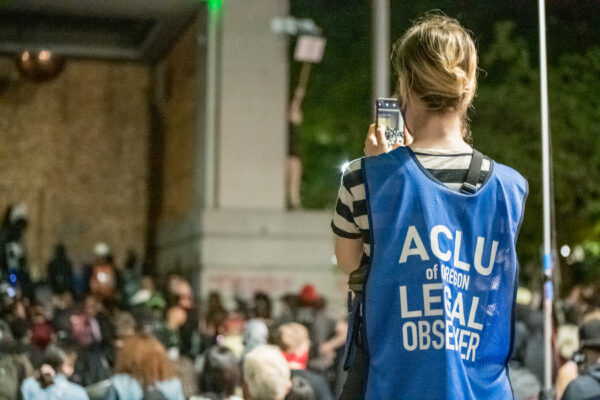Last week, journalist, April Ehrlich Fonseca, announced that the two criminal charges – trespass and resisting arrest – that the City of Medford was pursuing against her had been dismissed. On September 22, 2020, Fonseca arrived at Hawthorne Park to report on a police eviction of nearly 100 people who had been displaced by the Alameda wildfire. She began documenting law enforcement interactions with unhoused people residing in the public park. Despite identifying herself as a member of the press, police asked Fonseca to leave and arrested her for refusing to do so.
The Fonseca case dismissal marks another Oregon victory for the public’s First Amendment right to monitor government activities.
The First Amendment, which protects the right to record matters of public interest, also extends to the right to record police officers engaged in their official duties in public places.
The City of Medford ignored repeated admonitions from the Reporters Committee for Freedom of the Press, the ACLU of Oregon, and over 50 other media and advocacy groups who opined that the arrest and prosecution of Fonseca were blatant violations of the state and federal constitutions. These same groups asked permission to file a friend-of-the-court brief in support of Ms. Fonseca’s state and federal constitutional rights. Shortly thereafter, the Medford municipal court dismissed the trespass charge, and a few days later, the City of Medford voluntarily dismissed the resisting arrest charge, too.
The Fonseca case dismissal marks another Oregon victory for the public’s First Amendment right to monitor government activities.
In ACLU of Oregon’s Index Newspapers case, the Ninth Circuit Court of Appeals addressed the misconception that the press is entitled to a “special right” of access and clarified that while there is no special right, “the press is entitled to a right at least coextensive with the right enjoyed by the public at large.”
Similarly, Fonseca did not assert a constitutional right to trespass or that journalists uniquely enjoy a right to defy police orders unavailable to the public. Instead, she invoked the basic and universally applicable principle that police officers are not a law unto themselves and cannot require us to follow orders with no legal basis.
When the government takes the incredible step of denying any of one of us our First Amendment rights, it must be able to show it has an interest that outweighs the right that we exercise. Just like the government in Index Newspapers, the City of Medford failed to show that forcing Ms. Fonseca out of the reporting range of the sweep was essential to their governmental interest in evicting people living in the park.
As Index Newspapers instructs, “The public has a vital interest in preserving the media’s ability to monitor government.”
In recent years, the right of the press to access and report on government activities like police responses to protests and public health emergencies has been especially vital. However, local and federal police throughout Oregon have actively worked to obscure the view of the public eye by barring press coverage, operating in secrecy without identification, and targeting reporters and legal observers with arrest.
As the country grapples with a multitude of anti-democratic attacks at all levels of government, the ACLU of Oregon is working with partners to vigilantly defend the freedom of the press in local and federal courts. A core component of the free press is the right to access public places in which the government conducts its business. The United States Supreme Court has long recognized this First Amendment protection because journalists serve as “surrogates for the public” to ensure transparency, accountability, and the health of our democracy.
Ms. Fonseca’s victory marks another critical protection for press access rights.





